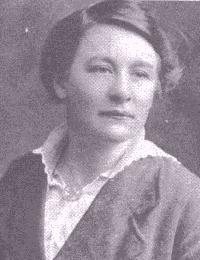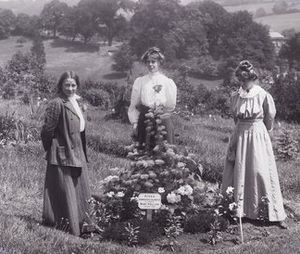Adela Pankhurst facts for kids
Quick facts for kids
Adela Walsh
|
|
|---|---|

Adela Walsh (taken before 1921)
|
|
| Personal details | |
| Born |
Adela Constantia Mary Pankhurst
19 June 1885 Chorlton upon Medlock, Lancashire, England |
| Died | 23 May 1961 (aged 75) Wahroonga, Sydney, Australia |
| Citizenship | Australian |
| Political party | Independent Labour Party Communist Party of Australia Australia First Movement |
| Spouse | Thomas Walsh |
| Children | 6 |
| Parents | Richard Pankhurst Emmeline Goulden |
| Relatives | Christabel Pankhurst (sister) Sylvia Pankhurst (sister) Richard Pankhurst (nephew) Helen Pankhurst (great-niece) Alula Pankhurst (great-nephew) |
Adela Constantia Mary Pankhurst Walsh (born June 19, 1885 – died May 23, 1961) was a British suffragette. A suffragette was a woman who fought for the right to vote. Adela worked as a political organizer for the WSPU in Scotland. In 1914, she moved to Australia. There, she continued her activism. She helped start both the Communist Party of Australia and the Australia First Movement with her husband, Tom Walsh.
Contents
Adela's Early Life
Adela Pankhurst was born on June 19, 1885, in Manchester, England. Her family was very involved in politics.
- Her father, Richard Pankhurst, was a socialist. This means he believed in a fairer society where wealth is shared. He also ran for Parliament.
- Her mother, Emmeline Pankhurst, and sisters, Sylvia and Christabel, were leaders of the British suffragette movement.
Adela went to Studley Horticultural College and Manchester High School for Girls.
Activism in the UK
As a teenager, Adela joined the Women's Social and Political Union (WSPU). Her mother and sisters started this group. The WSPU used strong methods to fight for women's voting rights.
Protests and Arrests
In November 1909, Adela joined a protest in Dundee. They interrupted a speech by Winston Churchill. Adela was arrested with other suffragettes. She had slapped a policeman who tried to remove her. While in prison, Adela went on a hunger strike. This means she refused to eat. However, she was not forced to eat because doctors worried about her heart.
Eagle House Refuge
Eagle House in Somerset was a safe place for suffragettes released from prison. Trees were planted there to honor important suffragettes. These included Adela's mother, Emmeline, and her sister, Christabel. Adela visited Eagle House in 1909 and 1910. She planted a Himalayan Cedar tree on July 3, 1910.
Family Disagreements
Adela's mother, Emmeline, and sister, Christabel, focused on getting votes for middle-class women. Adela and her other sister, Sylvia, believed in socialism. They wanted voting rights for all women, not just some. This caused a disagreement. Sylvia left the WSPU and started her own group. Christabel reportedly told Sylvia, "I would not care if you were multiplied by a hundred, but one of Adela is too many." Adela was given money and a ticket to Australia. She also received a letter to introduce her to Vida Goldstein, another activist. Adela was one of the first suffragettes to go on a hunger strike in prison. She was a well-known activist, so the police often targeted her. The WSPU gave Adela Pankhurst a Hunger Strike Medal for her bravery.
Life and Work in Australia
Adela moved to Australia in 1914. She had grown apart from her family and had been in prison many times.
Anti-War Activism
During World War I, Adela joined the Women's Peace Army in Melbourne. She worked as an organizer for them. Adela wrote a book called Put Up the Sword and many anti-war pamphlets. She spoke at public meetings against the war and against conscription. Conscription is when people are forced to join the military.
In 1915, she traveled across Australia with Cecilia John. They set up new branches of the Women's Peace Army. In 1916, she visited New Zealand, speaking to large crowds. She also toured New South Wales and Queensland. She explained why women should oppose militarism, which is the belief that a country should have a strong military.
Later Activism and Family
In August 1917, Adela was arrested during a protest in Melbourne. This protest was against rising food prices. These protests were unusual because women led them. Another British suffragette, Louie Cullen, who was also in Melbourne, signed a petition for Adela's release.
In September 1917, Adela married Tom Walsh. He was a leader in the Federated Seamen's Union of Australasia. They had six children together. In 1920, Adela helped start the Communist Party of Australia. However, she was later removed from the party.
Adela became unhappy with communism. In 1927, she started the Australian Women's Guild of Empire. This group was against communism. In 1941, Adela helped found the Australia First Movement. This group was a nationalist movement that believed Australia should always come first. She visited Japan in 1939. In March 1942, she was arrested and held because she spoke out for peace with Japan. She was released in October of that year.
Tom Walsh died in 1943. After his death, Adela stopped her public work. In 1960, she became a Roman Catholic. She passed away on May 23, 1961, and was buried with Catholic traditions.
Remembering Adela Pankhurst
- Adela's name and picture are on the base of the statue of Millicent Fawcett in Parliament Square, London. This statue was revealed in 2018.
- Pankhurst Crescent, a street in the Canberra suburb of Gilmore, is named after her.
See also
 In Spanish: Adela Pankhurst para niños
In Spanish: Adela Pankhurst para niños
 | Mary Eliza Mahoney |
 | Susie King Taylor |
 | Ida Gray |
 | Eliza Ann Grier |


